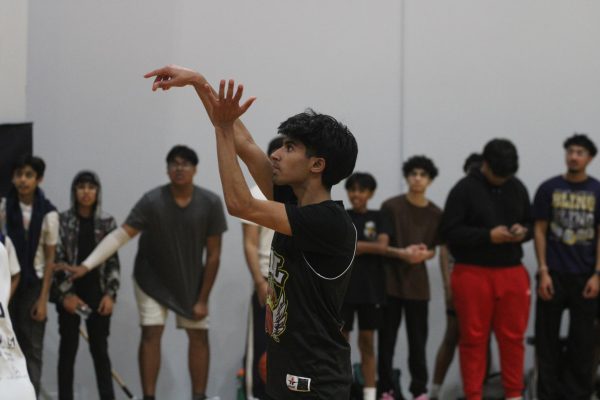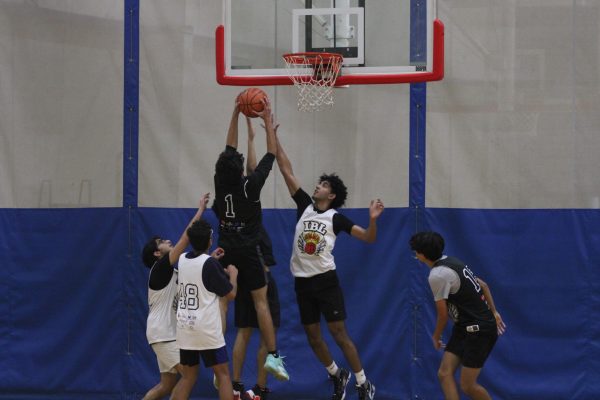The clock runs down, the buzzer sounds and the crowd screams.
They turn to look and see double the crowd they expected, as the team scores a last-minute three-pointer to send the final game into overtime.

Everything is on the line, the game determines the payoff for the hard work and success of the teams throughout the past six weeks. The competitive glances as friends go against each other, the crowd’s yells and chants in support of their team, this game is everything. The playoffs gave every team a chance to win and make it to the next round, with each team’s seed determining only their opponent.
Juniors Iliyan Walji, Arman Walimohammad and Haris Dosani worked together to create an opportunity for their community to come together: the Ismaili Basketball League (IBL). The Ismaili community consists of five Jamatkhanas (the house of community) in the central Dallas region. Teenagers from various areas meet weekly on Sundays to play games against their friends and other teenagers from the area.
“There’s multiple purposes to [IBL],” Walimohammad said. “Obviously, [there’s] playing basketball and having fun, but it also brings people together from different Jamatkhanas; it brings our Ismaili community together and [helps us] build more relationships.”
The first season of IBL started on Feb. 18 and ended on April 7. The games took place at Mac Sports — a complex in Lewisville that can be rented out for various sport games. The Mac consists of multiple basketball courts, as well as volleyball nets. IBL reserved two courts every week from 6:30 p.m. to 10:30 p.m. The commissioners were in charge of splitting up tasks to keep everything in order.
“Making sure we [had] all our suppliers [was difficult],” Walimohammad said. “Each of us were responsible [for] different [things], like our coolers for Gatorade, making sure all the refs are coming on time, contacting the court guy [to] make sure our courts are ready and make sure everything is set every week right before.”
IBL was primarily volunteer-based. When the commissioners started the league, they created a social media account where they posted updates. In the beginning, most of the posts were about drafts and completed teams, followed by posts to gather volunteers. Things like scoreboard, videos, photos and home/away statistics were all handled by high schoolers who signed up to volunteer and rotated weekly based on availability.
“Each of us would [take turns] putting out a poll and [making] a schedule, so [that] whoever is available is there,” Dosani said. “If there was only one of us running it, it wouldn’t work. The most important part is [that] we all have a role and we all contribute to [IBL].”
With fees such as court rentals, Gatorade, jerseys and shirts, IBL had about 10 sponsors in order to help them start the league; this included Texas State Representative Salman Bhojani. Walji said it was crucial for the commissioners to sit down and figure out budgeting, as the expected cost was over $9,000.
“We had to budget first to make sure we had all the money so everything was straight,” Walji said. “We saw that we didn’t have enough, so we got some sponsors with the connections that we had.”

High schoolers of all ages were allowed to participate and created teams to play in. Junior Rahil Jiwani drove 25 minutes weekly from Allen in order to participate and was named the leading scorer as he dropped 52 points in a game. Along with Jiwani, sophomore Ahad Virani – who was eventually voted this season’s most valuable player – said playing basketball has always been a hobby he enjoyed and it was fun getting to play with and against people from his community.
“I wanted to get better at the game and get better chemistry with my teammates [to] be stronger along the way,” Virani said. “Playing basketball is a team game, so you have to play with the team. You can’t do it by yourself, so playing with the team helps you get closer to your teammates.”
Teenagers from all around Dallas came to support their friends and siblings. Parents from various Jamatkhanas were volunteering to help out and were there to support their children. A total of seven games were played every week. Games went on for an hour, with the exception of a prime time game at 8:30 p.m. The commissioners were in charge of splitting up tasks to keep everything in order. On the last playoff game, on April 7, religious leaders came by to support and watch this vision come to life.
“IBL is a way for us to bring all of the teenagers and kids in our community together in one place, while also giving people a way to play basketball together and get better,” junior Rahil Jiwani said. “Whenever I was talking to my friends, we would always be talking about IBL and the next week. That something to talk about created a lot of connections for me and it brought me closer to a lot of people.”


